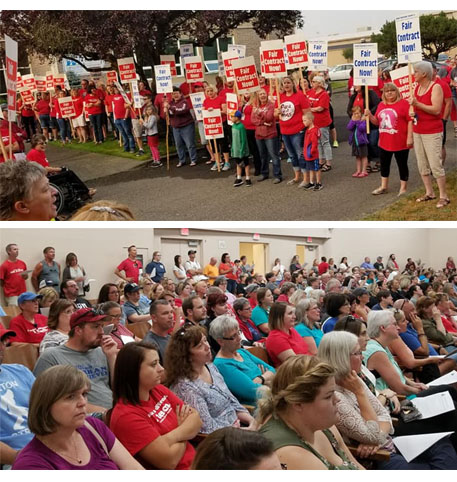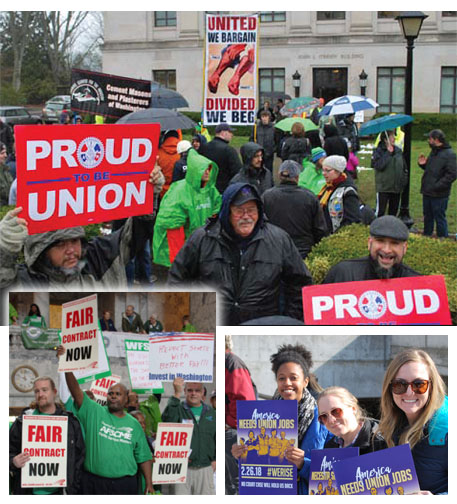Right-wing efforts to weaken labor in Washington state have failed miserably
One year ago today, hundreds of rank-and-file union members rallied in cities across Washington state, vowing to stay “Union Strong” in the face of the latest right-wing attack against the labor movement.
By all accounts, they’ve made good on that promise.
On June 27, 2018, the U.S. Supreme Court ruled 5-4 along ideological lines on Janus v. AFSCME to impose so-called “right-to-work” restrictions on public employee unions nationwide. Since then, all state and local governments and all public employee unions have been banned from agreeing to fair-share provisions in their contracts. These provisions require all workers who benefit from a union contract to pay a representation fee to cover its costs, even if they choose not to be union members and pay full dues. Under Janus, unions are now required to represent non-members, even if they don’t pay a penny to support the effort. (Learn more about the Janus decision and how/why it happened here.)
Union members rallied around Washington state that day to deliver the message: not only will we continue to stand together, we will redouble our efforts to make our unions even stronger.
Sure enough, when the latest union membership numbers were released several months later, union membership had not dropped in Washington as the right-wingers intended, they’d gone up. Dramatically.
Washington state reported an extraordinary 10 percent jump in union membership, increasing to 19.8 percent of the total workforce in 2018, up from 18.8 percent in 2017, according to a report from the U.S. Department of Labor’s Bureau of Labor Statistics (BLS). With an additional 65,000 workers joining the ranks last year, there are an estimated 649,000 union members in Washington and it is now the third most unionized state in the nation.
In fact, as Janus was imposed, the number of “free-riders” (who are covered by a union contract but are not dues-paying union members) dropped by more than half in Washington state from 46,000 in 2017 to 22,000 in 2018. Local unions’ internal organizing campaigns to get existing members to recommit to their unions before and after the Janus decision produced measurable results. According to the BLS estimates, Washington now has the lowest percentageof these “union withdrawals” of any state in the country.
Also this year, the Democratic-controlled State Legislature passed legislation to bring state laws into compliance with Janus, providing clarity and consistency for public employee unions in Washington. HB 1575, updating our statutes while strengthening workers’ rights and freedom to join together in unions, passed and was signed into law by Gov. Jay Inslee.
All of this is the exact opposite of what was intended by the Janus-supporting billionaire-funded network of right-wing anti-union think tanks, including Washington state’s own “Freedom Foundation.” That group has spent more than $20 million over the past five years to discourage union membership, stepping up its efforts in the wake of Janus with an Opt Out Today program to weaken unions by convincing members to quit. To date, all that money and those efforts have failed miserably.
You can credit a number of factors for Washington unions’ remarkable success in solidarity:
► Unions in Washington state were prepared for the Janus decision. More than a year before Janus was decided, unions knew that the court’s conservative majority was bent on such an attack. In preparation, many public employee unions in Washington launched unprecedented internal organizing campaigns to remind existing members of the importance of sticking together to stay strong. They also sought to reengage withdrawn and inactive members to demonstrate the value of the union.
The Washington State Labor Council, AFL-CIO hosted a Building Strong Unions summitmonths before the Janus decision to highlight and share the best practices for internal organizing that were being used by various affiliated unions. A number of private-sector unions not directly affected by the Janus decision participated and also launched campaigns to reengage existing members.
 ► Teachers and others demonstrated the value of strong unions. In 2018, teachers with the Washington Education Association and other unionized public school employees from across the state lobbied, rallied, and in several cases, went on strike for better wages. There was strong solidarity on picket lines and at demonstrations, both internally and from other unions and community supporters backing the teachers. In the end, most teachers won double-digit pay increases and other important gains.
► Teachers and others demonstrated the value of strong unions. In 2018, teachers with the Washington Education Association and other unionized public school employees from across the state lobbied, rallied, and in several cases, went on strike for better wages. There was strong solidarity on picket lines and at demonstrations, both internally and from other unions and community supporters backing the teachers. In the end, most teachers won double-digit pay increases and other important gains.
Nothing demonstrates the power of a strong union like success at the bargaining table. And collective action by many other Washington workers accomplished that in 2018 for all to see — from heavy equipment operators (IUOE), to university academic employees (UAW), to hotel workers (UNITE HERE), to state employees (WFSE, Teamsters, SEIU and others), to nurses and hospital workers (WSNA, SEIU, UFCW and others).
These workers won contracts that showed the power of solidarity to their members and the public.
► Washington is a Union State. As we celebrate the 100th anniversary of the 1919 Seattle General Strike, many historians note that Washington has always been a populist pro-worker state with deep skepticism about corporate control. A century of peaceful and successful collective action at Boeing, in our state’s construction trades and at grocery stores, to name a few, have demonstrated the value of unions.
With 19.8 percent of Washington’s workforce unionized, our state has the the third highest union density in the nation (behind only New York and Hawaii). In 2018, Washington’s unions grew by 65,000, according to BLS data, and now number almost 650,000 rank-and-file members.
Not only have Washington’s unions effectively advocated for their members, they have publicly fought for and won groundbreaking labor standards for all workers in Washington state. Those include a relatively high minimum wage that’s indexed to increase automatically, paid sick leave for all workers, strong state-run safety nets for injured and laid-off workers, work safety standards that exceed federal minimums, workforce training and apprenticeship programs that are national models, and now, a groundbreaking paid family and medical leave insurance program.
These progressive pro-worker gains have each been decried by Washington’s corporate lobbyists and think tanks as anti-business “job killers.” And yet, Washington’s thriving economy, educated and skilled workforce, diverse and stable industrial base, and low unemployment are the envy of the nation. In fact, site selection experts and national publications consistently rank Washington as one of the best states — if not the very best state— to do business in America.
Bottom line: Washington workers aren’t buying the Freedom Foundation’s snake oil.
We understand the value of joining together — and sticking together — in unions to negotiate for a better life for our families. We know that strong unions are what created America’s middle class. And we know that right-wing fringe groups financed by billionaire industrialists do not have our best interests at heart.
That’s why we are staying Union Strong in Washington!
If you want to find out how the power of a strong union can help you and your co-workers, contact a union organizer today.

